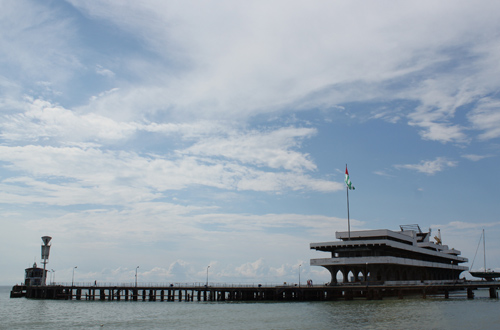
Abkhaz flag flies over one of the piers in Sokhumi, August, 2013. Photo: Olesya Vartanyan of RFE/RL’s Ekho Kavkaza
The road from Gali to Sokhumi shows signs of Abkhazia’s former prosperity. The tea factories in Achigvara and Dranda, used to employ hundreds of workers at the processing plants and in the fields. The buildings now lie decaying and abandoned.
On the gently rolling hills behind them, tea plantations were producing an annual of about 110,000 tons in late 1980s. These days the production is down to 704 tons, according to the breakaway region’s Chamber of Commerce and Industry.
“Now it is all сорняк, weed,” sighs Artur, a driver from Sokhumi.
Across Abkhazia nature has reclaimed thousands of buildings, from the concrete skeletons of Soviet factories to the elegant opulence of Tsarist sanatoriums through the graceful grandeur of 19th century palaces. What was not destroyed during the 13-month war in 1992-1993 fell into decay in the twenty years that followed. Sanctions imposed by the Commonwealth of Independent State (CIS) in 1996 are still formally in place, although Russia unilaterally dropped them in March 2008.
Yet nature offers the region its only lifeline. Its pebbled beaches, overlooking the indigo-coloured Black Sea stretch for 200 kilometres, attract hundreds of thousands of tourists, almost exclusively Russians in search of sun.
“We want to have our tourism industry upgraded, because it has lots of potential,” explains breakaway Abkhazia’s Foreign Minister Viacheslav Chirikba. “If you were on the French Cote d’Azur you could see that the landscape really looks like here. Of course it is dilapidated, but still the nature is similar, even more beautiful. So there are lots of possibilities to make it like what they have there…”
Tourism aside, Abkhazia depends heavily on imports. Its exports are limited to citrus fruits, wine and fish. According to the official Abkhaz statistics, Russia remains the principal market for Abkhazia, accounting for 64% of the exports, followed by Turkey.
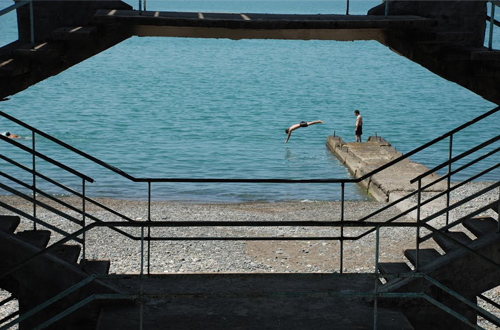
Boys swim near a concrete platform in Sokhumi, July, 2008. Photo: Monica Ellena
Frozen Out of the Games
The Sochi Olympics are just a cross-country race away and Abkhazia hoped to benefit from the Games USD 50 billion price tag. But as the world has descended on the Kremlin’s new sport Mecca, Abkhazia has not been invited to the party. Even though the Abkhaz leader, Alexander Ankvab, attended the opening ceremony, hopes that the Games would finally bring investment and employment were dashed.
Abkhaz building companies did not win any lucrative construction projects in Sochi; only a few labourers have picked up work. Abkhaz firms have provided an estimated 20 million tons of gravel and sand supplied to the building sites, but that is a fraction of what late Abkhaz leader Sergei Bagapsh was predicting in 2008.
In an interview in his office in downtown Sokhumi, Chirikba admits “there is not much impact on the Abkhazian economy apart from our contribution to the construction side, mainly in gravel.”
In an attempt to cash in, Sokhumi has simplified visa rules for foreigners entering Abkhazia from Russia during the Olympic Games. The move led Tbilisi to warn feigners that entering Abkhazia from Russia constitutes a violation of the Georgian law, subject to criminal prosecution in Georgia.
Tight Russian security measures have effectively sealed the Black Sea’s self-declared republic. Travel to and from the region are restricted: a quota system for cars has been enforced and trains to Moscow via Sochi, which resumed in 2008, have been suspended through the end of March when the Paralympics will close the Sochi events.
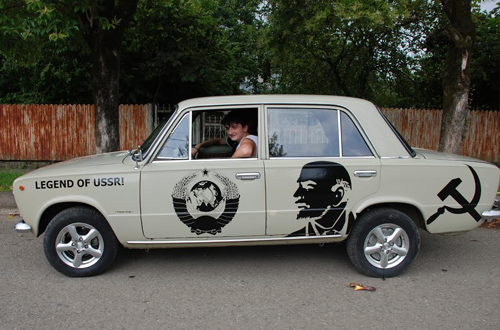
A young man in the town of Gali shows off his Soviet-old car with graffiti of Soviet symbols, July, 2008. Photo: Monica Ellena
On January 20 “border zone” was extended 11km inside Abkhazia, a move that was condemned by the Georgian government as an “illegal” expansion that violated Georgia’s sovereignty.
The Abkhaz authorities play it down.
“It is a security zone. The border stays where it should be, on the river Psou,” specifies Chirikba. “It is like an extended buffer zone, and it is a temporary measure. After the Olympics it will go back to normal.”
Unable to Compete
For Abkhazians, Sochi is also a sporting disappointment. Abkhazian athletes are not allowed to compete in the Olympics, and have to join other teams, more often than not Russia’s, to compete internationally.
Denis Tsargush is an Abkhaz icon. The 27 year old wrestler from Gudauta is a two-time European champion who won the bronze medal at the London Olympics in 2012 in the men’s 74 kg category, but under the Russian flag.
“We nurture our sportsmen but they have to leave to develop and compete internationally, it is a real talent drain. Promising athletes like Rustem Ampar, another wrestler, or Alain Avidzba, a 14 year old tennis player considered the world’s best in his category, are now in Moscow,” sighs Yuri Logua, Abkhaz Deputy Minister of Sport and Youth Affairs.
He says that “the problem is not Russia, but the fact that the rest of the world does not recognize us. Security measures are inevitable in every international sport event, especially for the Olympics.”
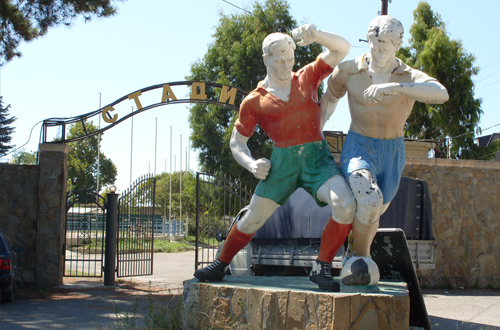
Entrance of the Gagra central stadium, August, 2010. Photo: Olesya Vartanyan / RFE/RL’s Ekho Kavkaza
The former Dinamo Sukhumi football player and coach is a sportsman at heart.
“Politics should be kept away from sport. How can you explain to a young kid why he cannot compete under his nation’s flag?”
But speaking from his small gym in Sokhumi, Akhra Abukhba, Abkhazia’s chief karate coach, has more grounds for optimism.
“Karate is not an Olympic discipline yet, which means the international federation and individual countries can decide whether a national team can compete in an international tournament,” he explains. “In 2010 we participated to the World Cup in Spain, winning as a team. Last year we competed in Mexico. In June the Abkhaz team will be in Cuba.”
Even so, international travel is difficult. Examples of Abkhaz athletes who are denied visa to travel abroad are numerous. The result is that when they are allowed to compete, they cannot arrive at the venues.
Dependence or Independence?
Games apart, Abkhazia maintains strong ties with Moscow. The Kremlin formally recognized Abkhazia and Georgia’s another breakaway region of South Ossetia as independent countries after a brief war with Georgia in August 2008. Georgia declared the two regions as territories “occupied” by Russia.
Moscow has granted Abkhazia over USD 300 million in financial aid in 2010-2012, according to the Russian Foreign Ministry, and it has pledged additional USD 90 million for the next three years. Altogether, the International Crisis Groups estimated that in 2012 Russia’s actual subsidy for Abkhazia’s budget was at least 70%.
This is much needed money in a land where bullet-pocked and bomb-damaged buildings remain an everyday sight.
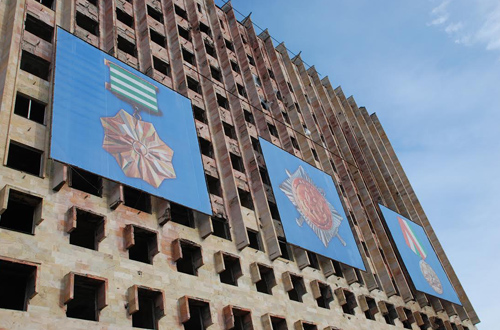
A former government building, destroyed during the armed conflict twenty years ago, stands in the center of Sokhumi. Photo: Monica Ellena
On September 27 1993, Abkhaz forces raised the national flag on the government building in Sokhumi, effectively ending the armed hostilities of one of the bloodiest conflicts following the collapse of the Soviet Union. The war left thousands dead and over 250,000 Georgians displaced. About 1,800 people from both sides are still missing.
The Russian influence runs deep. Abkhazia adopted Russia’s international phone code, and uses its currency, the ruble. Ninety percent of its estimated 240,000 citizens have Russian passports. About 30,000 Abkhazians receive their Russian pensions. There are about 3,500 Russian military personnel and 1,500 border guard officers from the Russian Federal Security Service stationed in the territory.
“Russia is not going to occupy us or annex us, there is no way Abkhazia will become part of Russia,” Chirikba insists. “I don’t see a threat, Russia is helping us to stand on our feet.”
Alongside Abkhaz, Russian is also an official language, and it is by far the most common language heard in the streets. A linguist and an academic who returned to Sukhumi Sokhumi in 2007 after seventeen years in The Netherlands, Chirikba admits that this is an area where his government should do more.
“There is a potential threat to the language, yes. It is not dying out at all, but still there is a narrow number of places where it is used. We have a special law which will be fully enforced in 2015, which [has] a provision that all the establishment, state, education, and others will shift to the Abkhazian language.”
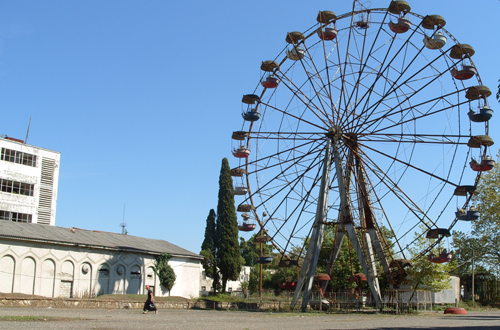
A woman passes by an abandoned Soviet-old ferris wheel in Tkvarcheli, a town in eastern part of Abkhazia, which was the region’s industrial center during the Soviet times with its coal mining and processing factory. Photo taken in August, 2010 by Olesya Vartanyan of RFE/RL’s Ekho Kavkaza.
Madina Sulava, a youth activist, shares Chirikba’s worries.
“My family speaks Abkhaz at home, but Russian is slowly taking over in everyday social communication. I think the government should do more, it takes very little for a language to vanish with a relatively small number of speakers. While in a day to day communication Abkhaz is still irreplaceable, we cannot compete with the leisure and entertainment programs on Russian TV or news on the Internet.”
Moving Forward
Russia’s cash has injected an appearance of prosperity. New hotels are being built, roads have been repaired, modern schools and kindergarten are under construction.
On tidy palm-tree lined streets, shops boast logos of Western brands, like Benetton and Converse. Fancy cafés serve French and Italian food to smartly dressed customers surfing the free Wi-Fi.
On Sokhumi’s promenade old men play dominos – almost a national sport– and watch mothers pushing state-of-the art prams and teenagers snapping with their smartphones.
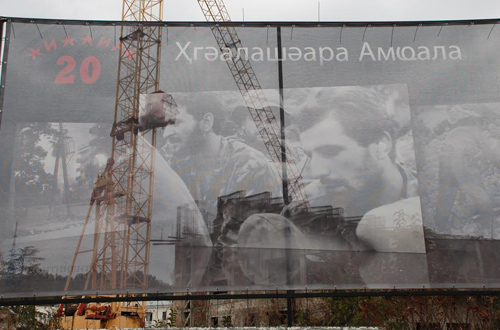
A construction site seen in Sokhumi through a billboard marking 20th anniversary of 1992-1993 conflict, January, 2014. Photo: Monica Ellena
Youngsters in Abkhazia – known as Apsny, or Land of the Soul – feel it is up to them now to find their nation’s soul and path.
In one bohemian café, a group of teens share their mixed feelings about the future.
“We didn’t experience the war, but we suffered its consequences, the blockade, the isolation,” says Ada. The fifteen years old, who writes poems and dreams of traveling to California, thinks that wider recognition is just a matter of time. “We must look ahead, the past is there to teach us to be strong.”
On February 7 the breakaway region’s Ministry of Foreign Affairs released a video aimed at promoting tourism to Abkhazia. The testimonials are seven young Abkhaz who studied abroad, people that Madina calls “Abkhazia’s unofficial ambassadors.”
But recognition is not the only main problem. Sulava thinks Abkhazia needs to focus on its internal development, “to show we can function as a democratic and independent country, that we can stand firm on our feet.”
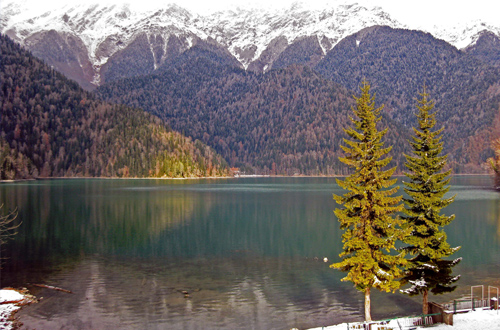
Mountain lake Ritsa, November, 2011. Photo: Birtute Steponenaite
A graduate in international relations, Sulava is actively involved in organizing English course to prepare students for TOEFL examinations, essential to apply for studying programs abroad.
“Studying and traveling are essential to show teenagers who were born after the war that there is more than fancy cars, a nice wedding photo, and fashionable clothes.”
After a brief trip to the US as part of a conflict dialogue workshop, Sulava discovered “there are so many things I wanted to do and I could reach from here, I decided to do more”. She went on to study Economics and Marketing in Brussels as part of an international study program involving both Abkhaz and Georgians.
“We talked a lot, we understood how difficult it has been and still is, for both,” she admits. “I am 28, I still remember the conflict, so do they. But 20 years have passed and what the world still calls a frozen conflict does not mean that Abkhazia is frozen. For better or worse, my country now is not what it was in 1993. We have moved on.”
About the author:
Monica Ellena is a Tbilisi-based freelance journalist
